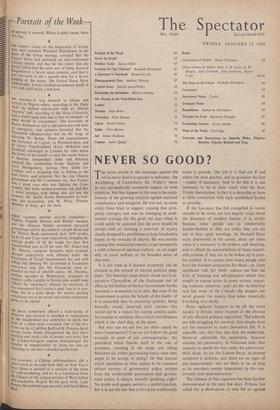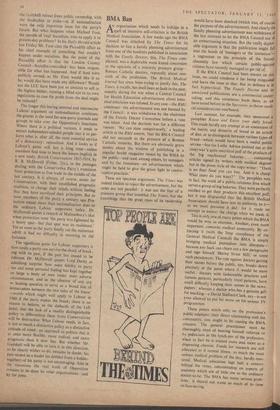NEVER SO GOOD?
THE latest recruit to the campaign against the we've-never-had-it-so-gooder is welcome: the Archbishop of Canterbury. Dr. Fisher's views do not automatically command respect, or even attention; but they happen in this case to be symp- tomatic of the growing reaction against national complacency and smugness. He was not, as some critics have tried to suggest, arguing that pros- perity corrupts; nor was he indulging in senti- mental cravings for the good old days when it could safely be assumed that the poor would be always with us, forming a reservoir of misery clearly designed by providence to keep busybodies happy in the exercise of charity. He was merely arguing that material prosperity is not necessarily a valid criterion of spiritual welfare: or, we might add, of social welfare, in the broadest sense of that term.
It is not even as if present prosperity can be claimed as the reward of shrewd political judg- ment. The financial crises which shook two Con- servative Chancellors of the Exchequer out of office in the lifetime of the last Government hardly represent a monument to its skill. But even if the Government is given the benefit of the doubt—if it is conceded that its economic policies, being basically sound, deserved, their success—this would not be a reason for casting caution aside; for ceasing to maintain that critical watchfulness which is the chief duty of the press.
But why can we not (we are often asked) be more `constructive'? Can we not follow the good example of some of our contemporaries: the periodical which fancies itself in the role of prompter, standing in the wings and telling Ministers (in rather patronising tones) what they ought to be saying, or doing? Or that journal which specialises in what appear to be reasoned critical surveys of government policy, written from the comfortable assumption that govern- - ment policy is always, broadly speaking, right? No doubt such papers perform a useful function, but it is not the one that-a fret press traditionally exists to provide. Our job is to find out if and where the shoe pinches, and to proclaim the fact —rudely if necessary. And to do this it is not necessary to be in close touch with the Boot Trades Association; in fact it is desirable to have as little connection with such established bodies as possible.
If the Spectator has felt compelled in recent months to be more, not less angrily vocal about the disorders of modern society, it is simply because when people are as ' comfortably feather-bedded as they are today they are apt not to hear quiet warnings. As Bernard Shaw early discovered in his career, there are times when it is necessary to be strident, and shocking, and to offend the susceptibilities of many respect- able citizens, if they are to be woken up to pain- ful realities. It is curious how many people who have the warmest admiration for Shaw—or, more significant still, for Swift—cannot see that the kind of humbug and self-deception which they sought to expose exists in every society, requir- ing constant attention; and—as the Archbishop said last week of the Church--the dangers are hever greater for society than when materially it is doing very nicely.
Press vigilance happens to be all the more needed in Britain today because of the absence of any effective political opposition. The Liberals are still struggling for survival; they simply have not the resources to make themselves felt. It is arguable, too, that they also lack the leadership. However admirable his sentiments, however amiable his personality, Jo Grimond lacks that capacity to needle his way under his adversaries' thick skins. As for the Labour Party, its present condition is pathetic; and there are no signs of any improvement—nor are likely to be, so long as its members remain hypnotised by the con- troversy over nationalisation.
The silliness of this argument has been further demonstrated in the past few days. Tribune has called for a show-down—a vote for or against the Gaitskell retreat from public ownership, with the leadership at stake—as if nationalisation were the only important issue for the party's future. But- what happens when Michael Foot, the apostle of 'real' Socialism, tries to apply it to present-day problems? In his Daily Herald article last Friday Mr. Foot cites the Piccadilly affair as his chief example of something that couldn't happen under socialism. But the point of the Piccadilly affair is that the London County Council—Socialist-controlled—has been respon- sible for what has happened. And if land were publicly owned, as Mr. Foot would like it to be, would that have made any difference? Would not the LCC have been just as anxious to sell to the highest bidder, turning a blind eye to its own regulations in case the profit from the deal might be reduced?
The longer this boring internal and internecine Labour argument on nationalisation continues, the greater is the need for non-party journals and groups to take over the Opposition's functions. Where there is a political vacuum, it tends to attract independent-minded people into it to per- form what is, after all, the most essential service of a democracy: opposition. And it looks as if Labour's pains will last a long time,—unless members find time to learn the lesson implicit in a new study, British Conservatism 1832-1914, by R. B. McDowell (Faber, 21s.), in the passages dealing with the Conservative Party's transition from protection to free trade in the middle of the last century. It is always, of course, easier for Conservatives, with their established pragmatic tradition, to change their minds without feeling that they have sacrificed their principles. But to most members of the party a century ago Pro- tection meant more than nationalisation does to the ordinary , Labour supporters today. Dr. McDowell quotes a remark of Malmesbury's that when protection went 'the party was lightened by a heavy spar--but that spar was its mainmast.' Yet as soon as the party finally cut the mainmast adrift it had no difficulty in restoring its old fortunes.
The significant point for Labour supporters is how easily a party can survive the shock of break- ing with its past, if the past has ceased to be relevant. Dr. McDowell quotes Lord Derby as admitting surprise 'how mere fidelity to party ties and some personal feeling has kept together so large a body of men under most adverse circumstances, and in the absence of any cry or leading question to serve as a broad line of demarcation between the two sides of the house' --1-words which might well apply to Labour in 1960 if the party makes the break; there is no reason to believe, as the diehards of the Left insist, that the lack of a readily distinguishable policy to differentiate them from Conservatives will be destructive. What Labour needs, in fact, is not so much a distinctive policy as a distinctive attitude of mind : an approach to politics that is at once more flexible, more radical, and more pragmatic than it now has. But whether Mr. Gaitskell will be able to turn it in this direction. as he clearly wishes to do, remains in doubt; his past record as a leader (as distinct from a holder- together) of his party is not encouraging. And in the meantime the real work of Opposition remains to. he done by other organisations- and by the press.



































 Previous page
Previous page